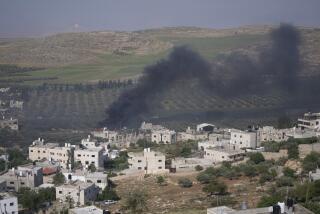Palestinian teens held in West Bank family’s deaths
- Share via
Reporting from Jerusalem — Israeli security officials said Sunday that they had arrested two Palestinian teenagers as suspects in the grisly slayings last month of five members of a Jewish family, including three children, as they slept in their West Bank settlement home.
Military officials said Hakim Awad, 17, and Amjad Awad, 18, who are cousins, confessed to the killings. Local Palestinian officials said they suspected the confessions were coerced and complained that the two students had not had access to attorneys or family members.
The suspects live in the Palestinian village of Awarta, next to the Itamar settlement where the killings took place. They were arrested earlier this month, but a court order barred publication of the news until Sunday.
“The murderers are in our hands,” said Col. Nimrod Aloni, commander of the brigade responsible for Itamar. He said the killings proved that “the motivation to carry out cruel terror attacks still exists.”
Military officials said the teens had not yet been formally charged. If charged, they would both be tried as adults in military court in the West Bank, where the cutoff age for minors is 16, military officials said
Israeli officials said the suspects had “nationalistic” motives and had stated during interrogation that their goal was to kill Jewish settlers living in the West Bank, which Israel has occupied since 1967.
Six other suspects — all part of the same family — were also arrested for allegedly helping the teens dispose of the weapons after the slayings, Israeli officials said.
Israel said the teens appeared to have acted without support from any organization, though they said some of the teens’ relatives were members of the Palestinian militant group known as the Popular Front for the Liberation of Palestine.
Immediately after the slayings, Israeli security forces focused their investigation on Awarta, where residents have had longstanding tensions with Itamar’s settlers, leading to previous deadly clashes and attacks. In 2002, four Itamar settlers were killed in an attack partly carried out by one of the teenagers’ uncles, who was later killed by Israeli soldiers, military officials said.
Several hundred Awarta residents were arrested over the last month and a military curfew was periodically imposed, residents said.
Awarta Mayor Qais Awad, who is from the same extended family, questioned the legitimacy of the Israeli investigation and complained that Israel had refused to allow Palestinian participation.
“I have very serious doubts about the Israeli claims,” he said. “We said we wanted to help because we also want to know the truth and want to see the one responsible for the killing punished. They refused and they carried out their own secret investigation. In the end, they came up with this story about the two boys. These two are just boys and they must have come under tremendous pressure and torture during interrogation that forced them to confess to something they have not done.”
The March 11 nighttime attack was one of the most brutal in years against West Bank settlers. Security officials accused the teens of using wire cutters to break through an electric fence surrounding the heavily protected settlement, then stealing a rifle from an empty home.
Shortly thereafter, they broke into the home of Udi and Ruth Fogel, first killing two children, Yoav, 11, and Elad, 4, then stabbing and shooting the parents, Israeli officials said. After fleeing the scene because they feared the gunshots would attract neighbors, the pair allegedly returned to the house, where they stole another rifle and stabbed the family’s 3-month-old baby, Hadas, who had begun to cry, according to Israeli officials. Two other small children in the house were apparently unnoticed and escaped harm.
A sixth child, who had been away at a youth outing, returned home around midnight to find the doors locked and alerted a neighbor.
Special correspondent Maher Abukhater in Ramallah, West Bank, contributed to this report.
More to Read
Sign up for Essential California
The most important California stories and recommendations in your inbox every morning.
You may occasionally receive promotional content from the Los Angeles Times.













